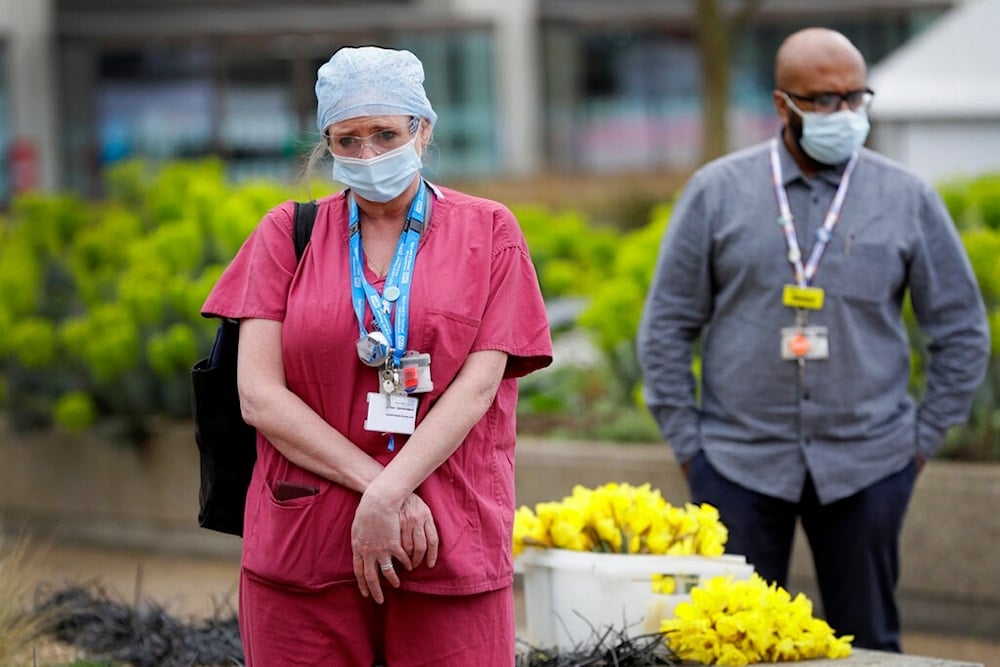Up to 50,000 migrant nurses may leave UK under new immigration plans
The UK's plan to double the wait for permanent residency and tighten visa rules has triggered warnings that up to 50,000 migrant nurses may leave the country, risking an unprecedented NHS staffing crisis.
-

Members of NHS staff gather for a minute of silence and reflection at St Thomas' hospital in London, Tuesday, March 23, 2021 (AP)
The UK could face the most severe staffing crisis in NHS history as many as 50,000 internationally recruited nurses consider leaving the country in response to the government’s proposed immigration overhaul, The Guardian reports. New policies aimed at reducing net migration, including extending the path to settlement from five to ten years, have triggered deep alarm among migrant healthcare workers and their representatives.
Prime Minister Keir Starmer has signaled a major tightening of the system, with upcoming measures expected to require higher skill levels, stricter English-language standards for all visas, and a far longer wait before migrants become eligible for Indefinite Leave to Remain (ILR). Officials close to the process say the consultation on these changes will be launched shortly.
The shift is widely seen as an attempt to counter the rise of Nigel Farage’s Reform UK, whose pressure on immigration has reshaped the political debate. However, NHS leaders say the consequences for healthcare staffing could be catastrophic.
Nursing Leaders Sound Alarm
The Royal College of Nursing (RCN) shared new findings showing that migrant nurses and social care workers are experiencing significant anxiety over the proposals. More than 200,000 nurses in the UK were trained abroad, roughly a quarter of the national nursing workforce, and many of them are directly affected by the suggested changes to ILR.
A survey of over 5,000 migrant nursing staff indicates that the impact could be dramatic: 60% of respondents without ILR said the plan is “very likely” to influence their decision to stay in the UK. Extrapolated across the entire workforce, that equates to more than 46,000 nurses potentially preparing to depart.
Prof Nicola Ranger, the RCN’s general secretary and chief executive, described the proposals as both unfair and dangerous. “These proposals are not just immoral, they would be dangerous for our patients. No minister who has any interest in the success of our health and social care system would press ahead with extending the qualifying period for ILR.”
She warned that the NHS is already unable to recruit enough domestic nurses to meet rising demand. “At a time when the government is failing to grow the domestic nursing workforce, it risks pushing tens of thousands of highly skilled nurses out of the UK,” she said.
Ranger added that those affected include staff who arrived during the height of Covid-19. “Many of those who will soon be applying for ILR came to the UK during the pandemic, at great personal sacrifice. This is no way to repay them and amounts to a betrayal. Our international colleagues deserve clarity over their futures, not to be used as political footballs by politicians and left unable to access state support despite working in public services and paying taxes.”
Staff Fear Financial and Family Hardship
Under the proposed model, migrant workers would remain tied to their employers for up to a decade, making it difficult to change jobs and leaving some vulnerable to exploitation in the social care sector. They also would not be able to access benefits, including child support and disability assistance, for the entire 10-year period, despite paying taxes throughout.
Survey responses show the emotional toll:
- 53% said they were extremely concerned about their financial stability
- 52% feared the impact on their families
- 49% worried about the effect on their careers
Future recruitment may also suffer, with only 11% of respondents saying they would have moved to the UK if the route to settlement were this long.
The RCN is also urging the government to revise the high cost of ILR applications, which currently stand at £3,029 per person despite an estimated processing cost of £523. Two decades ago, the fee was just £155.
Government Defends Its Approach
A government spokesperson acknowledged the contribution of migrant healthcare workers but argued that reducing net migration remains a priority. “We are grateful to our overseas frontline healthcare workers, who bring compassion, deliver high-quality care and strengthen our health service, but net migration must come down.”
They added that the new system would allow migrants to earn quicker access to settlement based on positive contributions. “As the Home Secretary has set out, under our proposed new settlement model, individuals will have the opportunity to reduce the qualifying period to settlement and citizenship based on contributions to the UK economy and society. We will launch the consultation shortly and encourage health and care workers to take part when it launches.”
Read more: UK to replace 5-year refugee residency route with 20-year plan

 5 Min Read
5 Min Read










